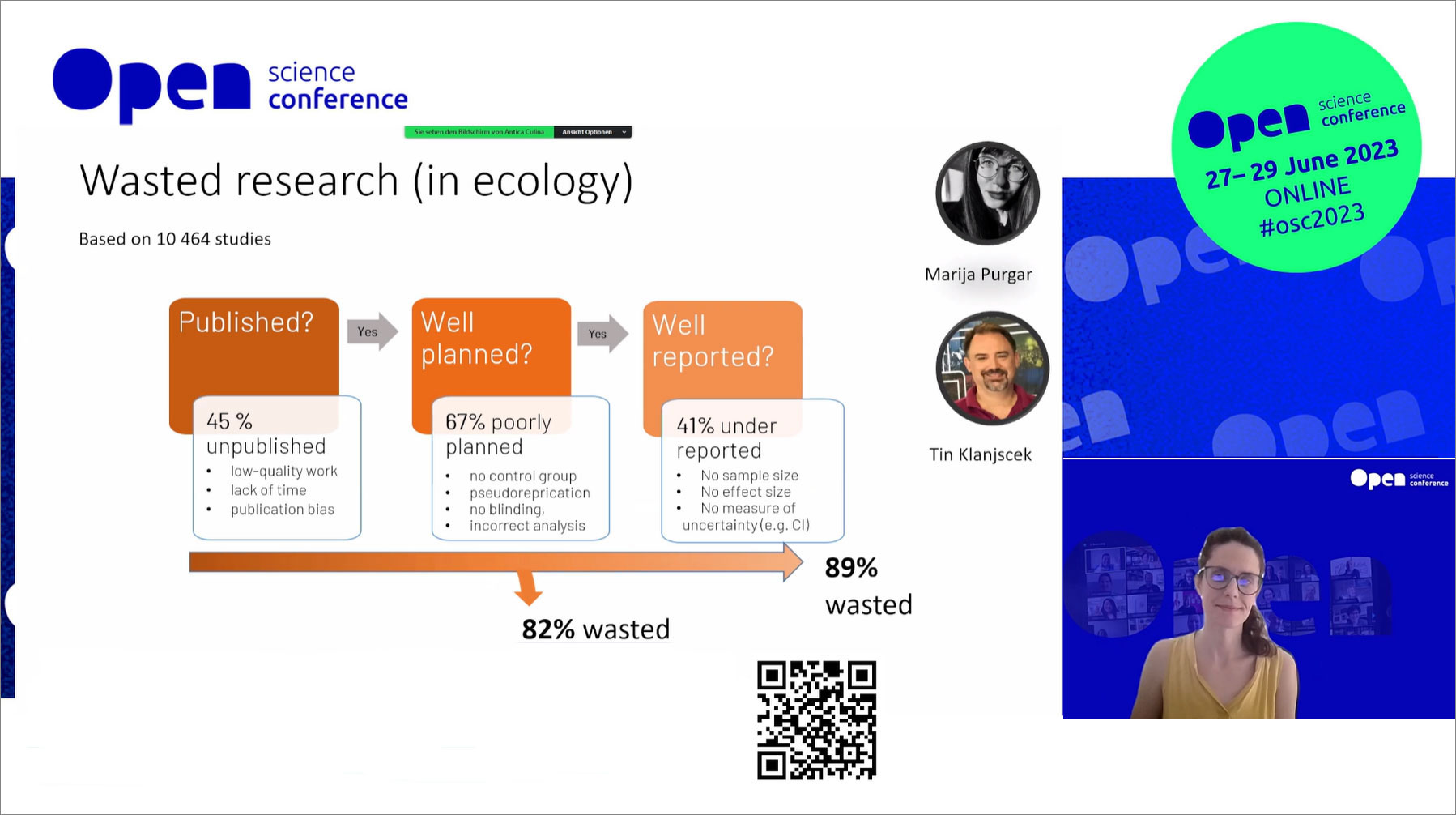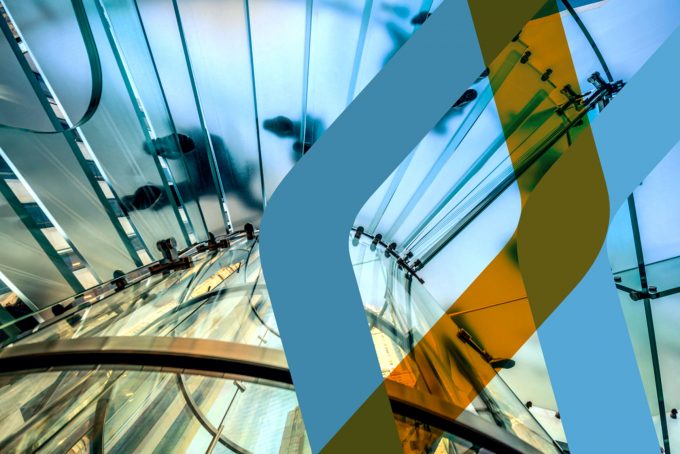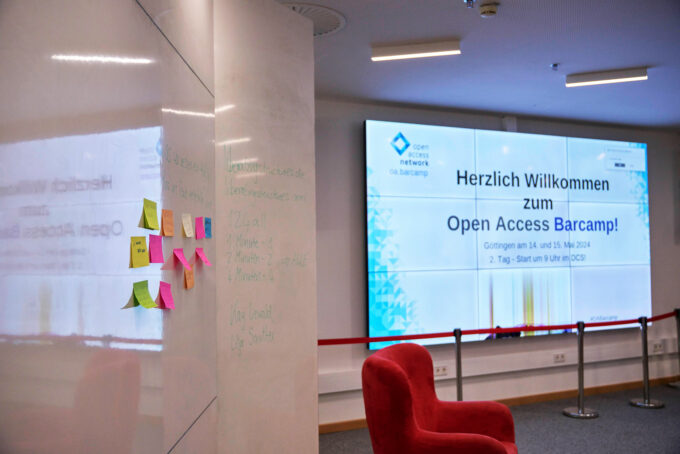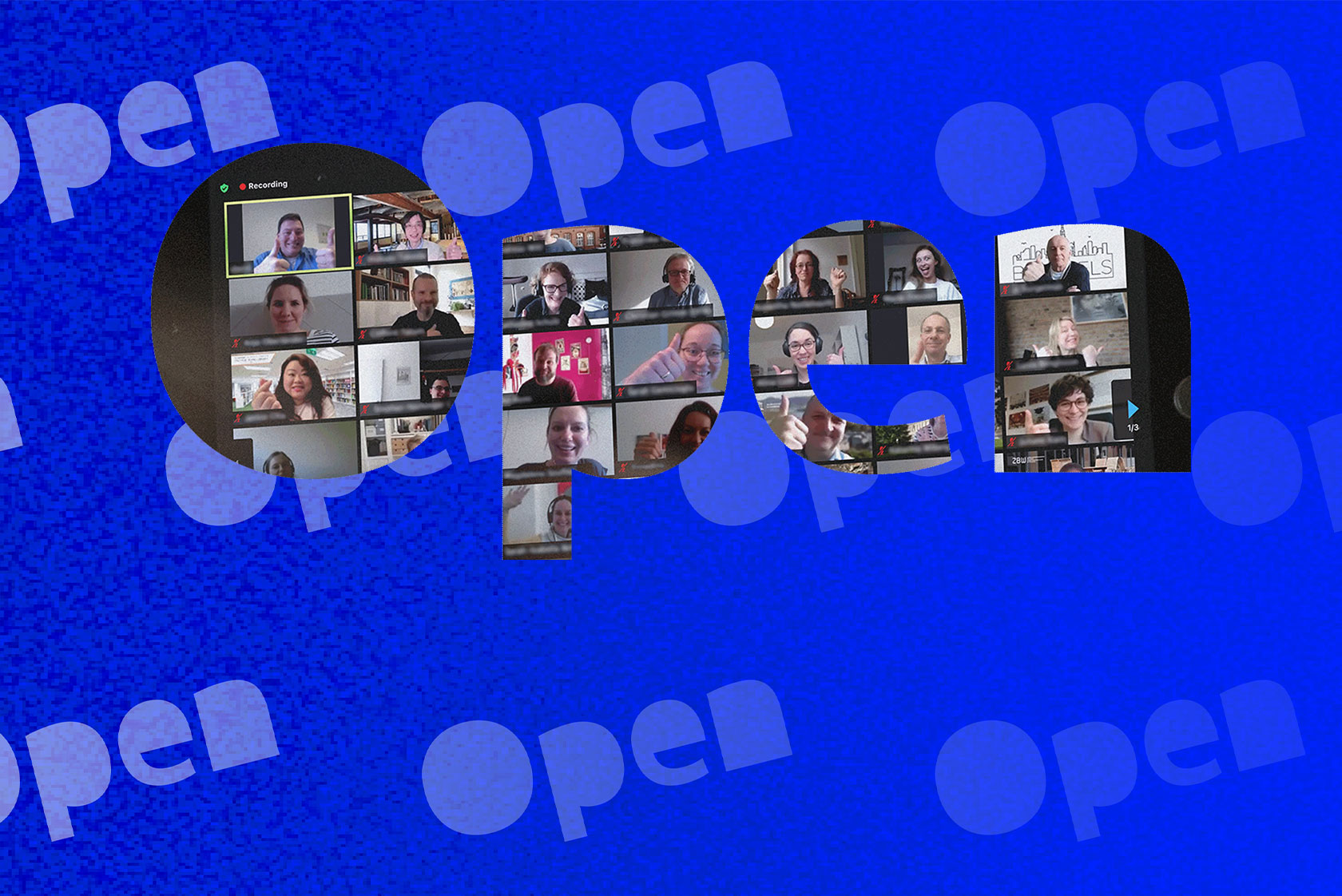
Open Science Conference 2023: Old Hurdles and new Practical Successes for the Anniversary
At the tenth anniversary of the Open Science Conference, several contributions impressively demonstrated how Open Science can be approached strategically and implemented in practice. In addition to successful examples of Open Practices, the challenges in the science system that continue to impede the full adoption of Open Science were also addressed.
by Birgit Fingerle and Guido Scherp
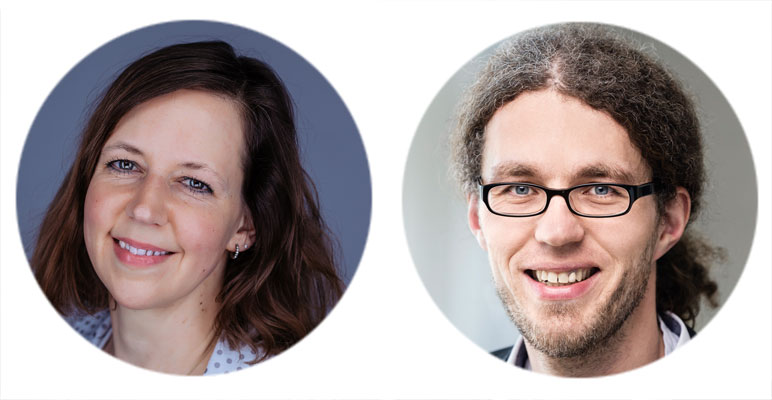
The tenth edition of the Open Science Conference 2023 took place on June 27-29, 2023 online. The 228 participants from 34 countries were offered a diverse program of 14 presentations, 21 practical solutions, eight workshops, and one panel.
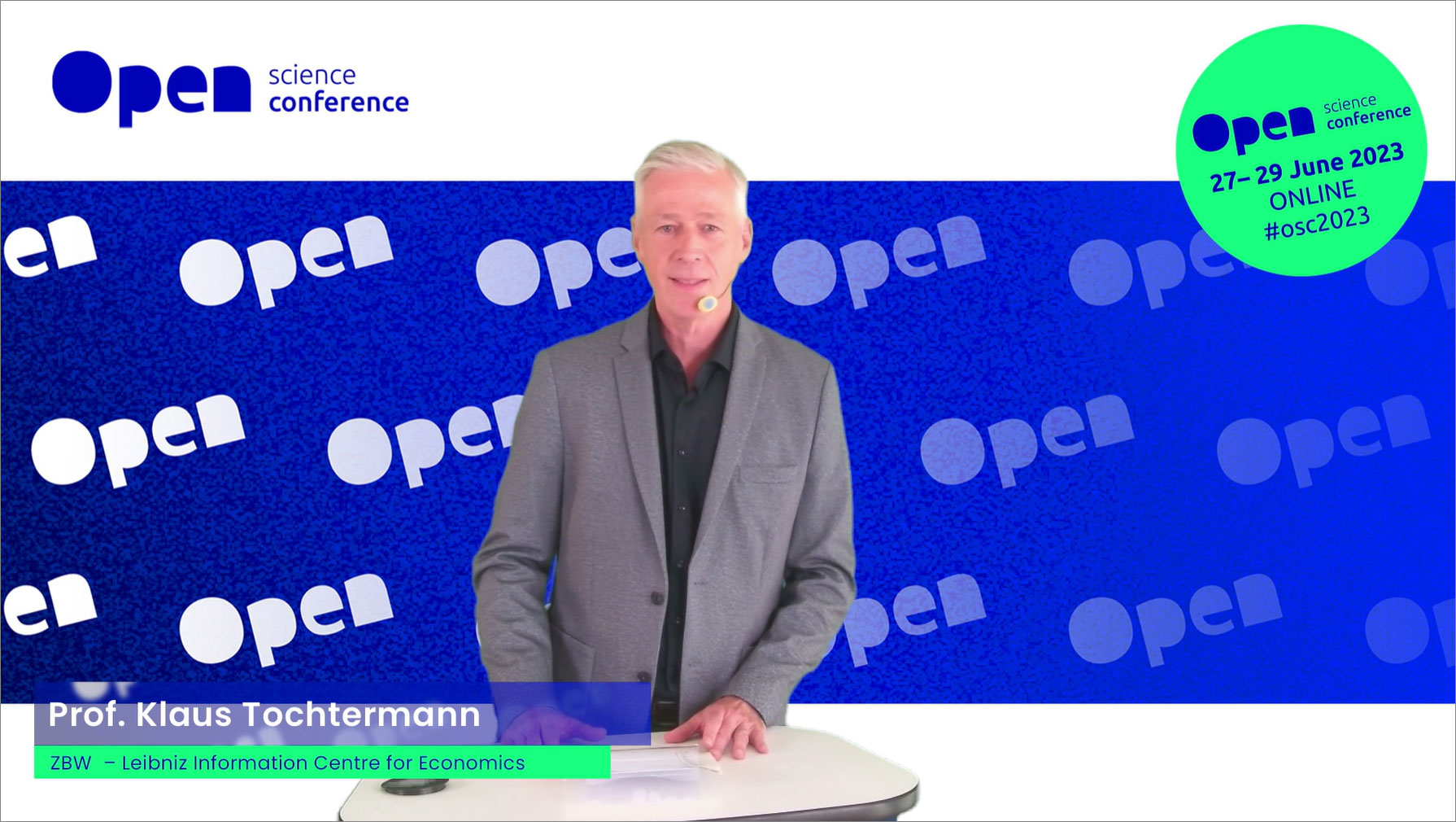
Youtube: Klaus Tochtermann: Opening Open Science Conference 2023, zbw©
As in previous years, the conference was opened by Professor Klaus Tochtermann, Director of the ZBW – Leibniz Information Center for Economics. He outlined the development of the conference since 2014, when it was established as Science 2.0 Conference. Its topics initially focused on the use of participatory tools, or rather on the influence of social media on research and the associated changes. Since 2017, Open Science has been the main focus, at first still strongly influenced by policy topics and a focus on research data, for example in the context of the European Open Science Cloud (EOSC). In addition to a broader range of topics, Open Science at the conference is increasingly viewed from a global perspective, for example topics such as inclusion and equity are being more and more addressed. The program nowadays is also strongly characterized by successful practical examples of Open Research, but current challenges are always considered as well. This blog post takes up some of the fascinating insights from the conference.
Good practices: Taking up Open Science strategically
Several contributions impressively demonstrated how Open Practices can be strategically anchored and implemented with very different objectives.
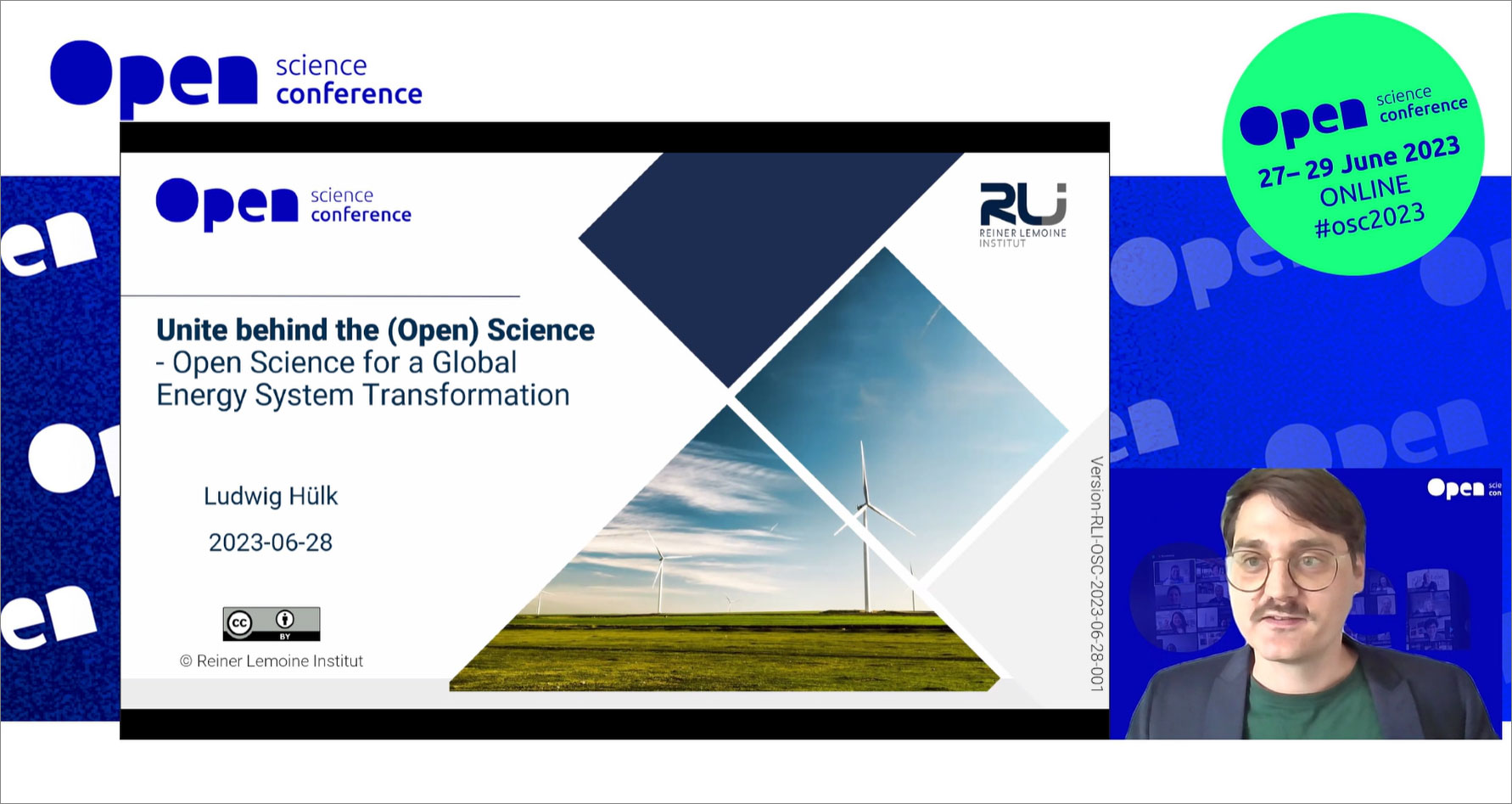
Youtube: Ludwig Hülk: Unite behind the (Open) Science – OS for a Global Energy System Transformation, zbw©
Ludwig Hülk, scientist and project leader at the Reiner Lemoine Institute, presented in his talk“Unite behind the (Open) Science – Open Science for a Global Energy System Transformation” how embedding Open Practices in the energy system research community has been successful. With energy-related CO2 emissions accounting for a large share of total emissions, decarbonizing energy systems is of particular relevance when addressing the climate crisis. And time is running out. Thus, efficiency and high re-usability of results were key triggers to consistently embed open practices. This has resulted in a collaborative Open Science ecosystem, with various platforms and tools for sharing open and FAIR data, for example. Some of the tools can also be used by the public.
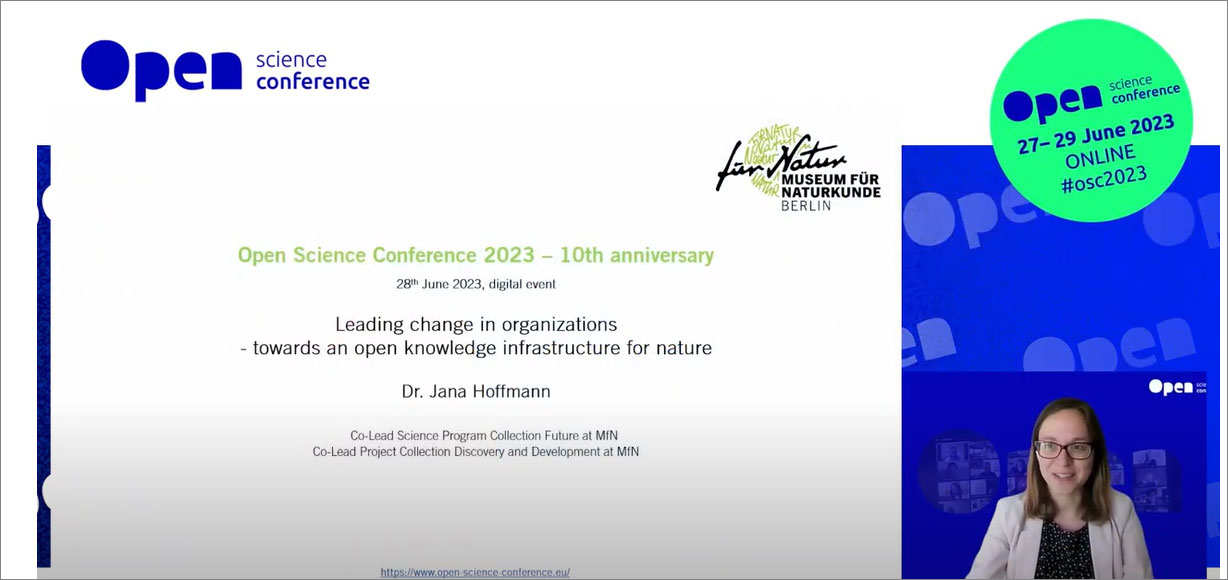
Youtube: Jana Hoffmann: Leading Change in Organizations: Towards an Open Knowledge Infrastructure for Nature, zbw©
In the presentation “Leading Change in Organizations: Towards an Open Knowledge Infrastructure for Nature” gab Jana Hoffmann, co-leader of the science program “Collection Future” at the Museum für Naturkunde Berlin (MfN), which is also a research museum, gave an insight into a transformation process underway there.
The goal is to develop the entire collection into an open knowledge infrastructure and to make it completely accessible in a new way, especially via digital methods. This serves research itself, but also brings research and the public closer together. With numerous examples, she showed how knowledge can be made accessible and new opportunities for public participation can be created in virtual space as well as on site – and how both worlds can be brought together. This made the collection a unique environment for trying out and reflecting on open practices.
Open Science against wasted research and further inefficiencies
The challenges facing researchers in ecology were the subject of the keynote talk “Meta-Science and Open Science for Ecology: The Revolution We Need” by Antica Culina, senior scientist at the Ruder Boskovic Institute. Her work on local and global challenges around climate change, which she hopes to solve with Open Science, is hampered not only by the extreme complexity of ecological systems, but also by the poor accessibility and re-usability of existing research. To this end, Antica Culina presented several case studies.
For example, she worked with other researchers to calculate “Wasted Research” in ecology. Result: Out of more than 10,000 studies, 45% were not even published. Of the published studies, in turn, a large proportion had serious quality deficiencies. This resulted in 82% wasted research in the best-case scenario and 89% in the worst-case scenario. She sees Open Science as a key enabler to improve these inefficiencies and solve the complex research challenges as quickly as possible.
There are a few examples of near-instantaneous data sharing in ecology. But in general, Open Science practices are still not widespread there. An analysis of Open Data found by the team in terms of its reusability was not very successful. In many cases, the data’s poor quality hindered its reusability. In another case, they found a lot of Open Data on a research question, but upon closer inspection were unable to conduct the planned study at the end of the day, again because of poor data quality.
Another area Antica Culina looked at was Open Code. Given the serious impact on research results that even small programming errors can have, she said it is surprising that code is not part of the peer review process, as it is in software development. Sharing code allows better understanding of analyses, evaluation of conclusions, and reuse of code, which can save a lot of work time. It also increases confidence in science because it boosts reproducibility. However, an analysis of data from 400 random papers from journals with code-sharing policies showed that 73% of the papers nevertheless had no code available. In conjunction with other problems, this led to only 21% of the paper being potentially computationally reproducible.
Motivation and commitment as drivers of Open Research
For the first time, this year’s conference featured so-called “highlight talks” on the latest research findings on Open Science.
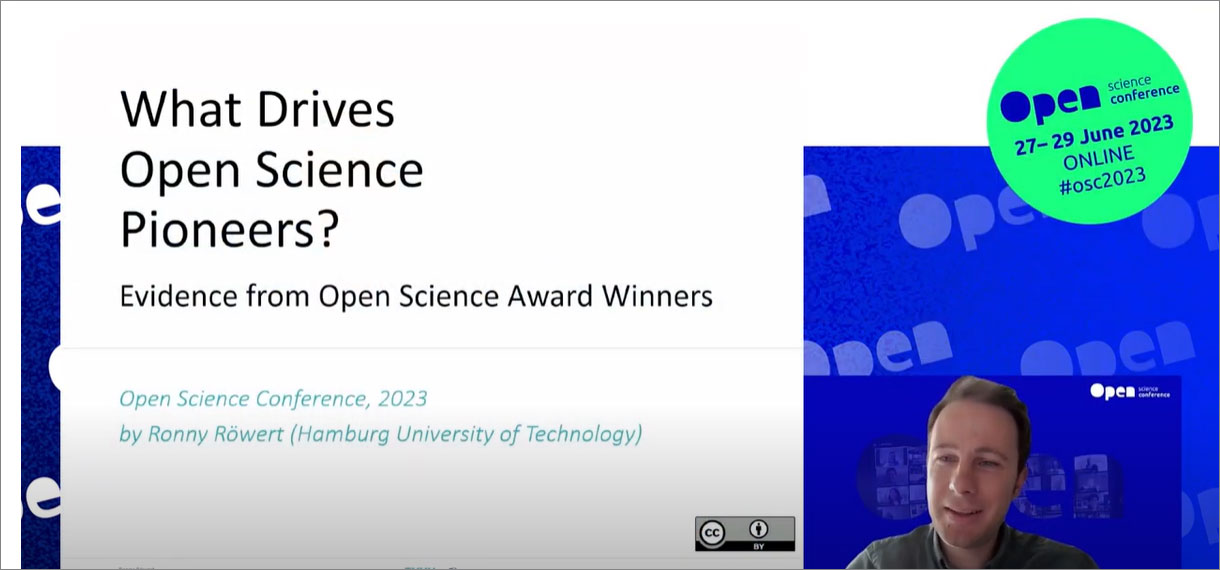
Youtube: Ronny Röwert: What Drives Open Science Pioneers? Evidence from Open Science Award Winners , zbw©
Ronny Röwert, research associate at the Institute for Technical Education and University Didactics at the Technical University of Hamburg, presented his study “What Drives Open Science Pioneers? Evidence from Open Science Award Winners” conducted as part of his doctoral thesis in which he had asked 13 thirteen winners of Open Science Awards about their motivations for Open Research. The most frequently cited reasons were the subsequent use of one’s own research results (benefit for science), citation advantages (benefit for researchers), and public interest or the social relevance of the research (benefit for society). Despite existing differences between the disciplines, there could always be observed a balanced interplay between egoistic and altruistic motives. In his conclusion, Röwert emphasized the importance of motivation in the implementation of Open Science and that appropriate framework conditions must be in place for a strong commitment. Otherwise:
“Research culture eats open science strategy for breakfast”.
In the contribution “Results of Monitoring on Open Science and Research in Finland: Perspective of the UAS Sector” Anne Kärki, researcher at Satakunta University of Applied Sciences, presented the results of an Open Science monitoring for universities of applied sciences (UAS) in Finland.
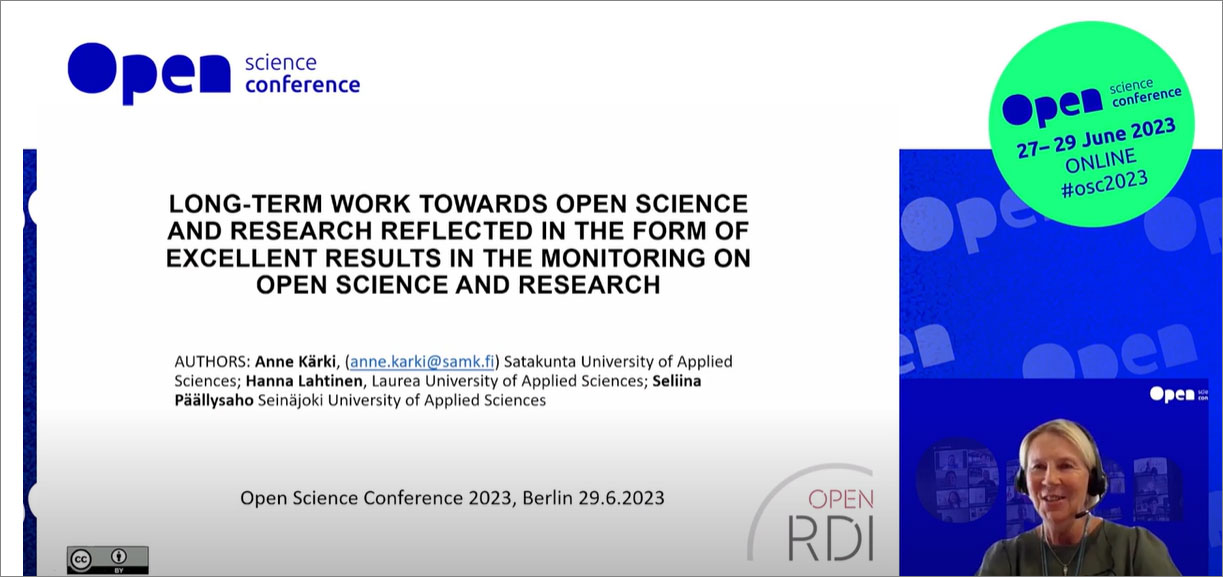
Youtube: Anne Kärki: Results of Monitoring on Open Science and Research in Finland: Perspective of the UAS Sector, zbw©
The “Declaration for Open Science and Research 2020-2025”, (PDF) is a shared vision for the Finnish research community, and the 23 UAS are united by their strong commitment to it. Questionnaire-based monitoring (the data is open) was used to measure the degree of implementation of openness for the first time. This covered the areas of culture for Open Science, Open Access to scientific publications, Open Access to research data and methods, and Open Education and Open Access to educational resources. It showed that the majority of UAS are already doing very well, especially in terms of Open Access. Deficits were identified with regard to Open Science culture, among other things because concepts such as Citizen Science are not yet really tangible. The area of Open Education was found to be very heterogeneous in its degree of implementation; some UAS have not yet taken it up at all. Kärki emphasized that the first monitoring deliberately did not yet include everything and was not as rigorous.
Involvement of young scientists central to reform of research assessment
The currently very present topic of reforming research assessment, which is driven in particular by CoARA (Coalition for advancing research assessment), and the connection of CoARA with Open Science were discussed at the panel on “Reforming Research Assessment in the Spirit of Open Science” diskutiert.
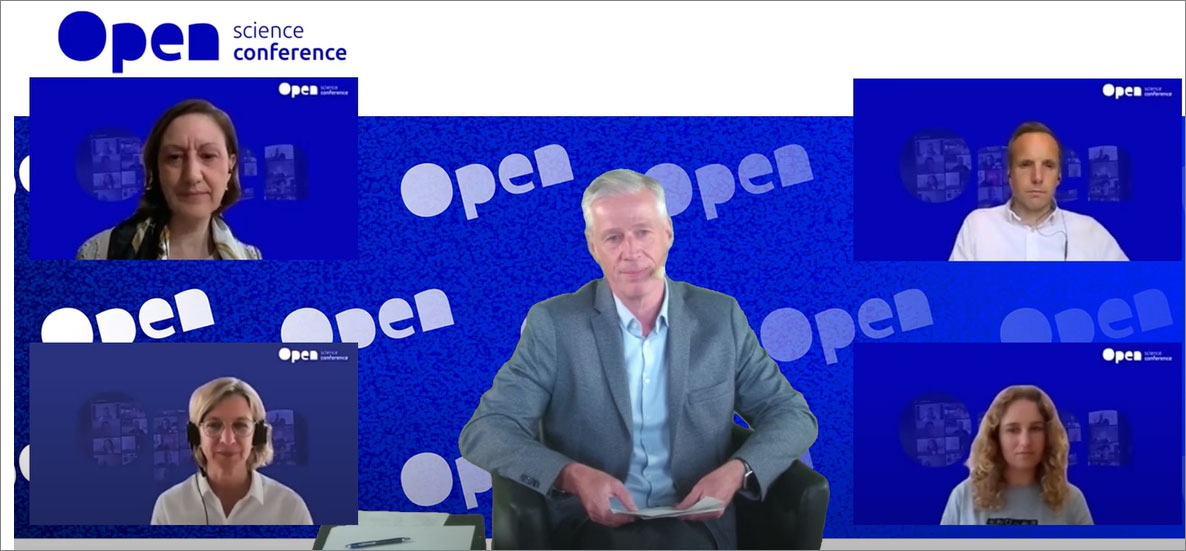
Youtube: Panel Discussion with Lidia Borrell-Damian, Iain Hrynaszkiewicz, Claudia Labisch and Iris Lechner: Reforming Research Assessment in the Spirit of Open Science, zbw©
With Lidia Borrell-Damian (Science Europe) as a member of the CoARA Steering Board, Iain Hrynaszkiewicz (PLOS) as a representative of a publisher, Claudia Labisch (Leibniz Association) as a representative of a research organization, and Iris Lechner as a young scientist, different perspectives were represented.
After initial hesitation, around 600 organizations have now signed the CoARA agreement , including PLOS and the Leibniz Association. There were and are definitely concerns from the research community. Among other things, there were fears that the reform process launched by the European Commission was too strongly guided by science policy and would take control away from the scientific community. In the meantime, these concerns have been dispelled. In the panel, it was stated that research assessment must of course remain science-led and existing systems must be taken into account.
The course of the discussion showed that Open Science is seen as an integral part of CoARA, being one of the key drivers. Therefore, the involvement of Open Science advocates must be ensured everywhere, including in the working groups to be established. The panel gave a clear message to the Open Science community:
“Get involved! After all, CoARA and Open Science have a common goal, to improve research.”
However, the role of publishers in this process has yet to be determined. At the moment, it is more of an observational role. Ultimately, part of the reform process is to enforce the recognition of more diverse research outputs, such as data and code. This will have implications for future publication formats, their linkage to each other, and their peer review.
The most important aspect emphasized several times was the consideration of early career researchers. They are already represented in the CoARA Steering Board and this will also be ensured for all working groups. In the context of the reforms, there must also be a broad discussion of what a future researcher actually is and what achievements are recognized, for example, team leadership, science communication and public involvement. The panel also emphasized that this process would take time and that young researchers should not lose patience. It is all the more important, they said, to design the transitional phase of research assessment in such a way that early career researchers are always given guidance. In a statement, the following applies to the reform process:
“Generation of young researchers must be the winners.”
We cannot turn the wheel back
To sum up the conference, a statement from the panel can be taken up: “We cannot turn the wheel back”. Even though there is still a long way to go, Open Science is well on its way to becoming the modus operandi of science, and with each passing year, more and more foundations are being laid. In 2023, the Open Science Conference again provided good insights into what Open Science can look like in practice.
All talks and the panel were recorded and can be found on YouTube. The slides for the presentations are available on Zenodo.
You may also find this interesting:
- Open Science Conference 2022: New Challenges at the Global Level
- Open Access Barcamp 2023: Live and in Color
- Open Science Symposium: Open Practices and Transparency in Business Studies and Economics
- Open Science Meet-Up: Creating the Future Together
- 10 Year of OERcamp: The Community Get-together on Digital and Open Educational
Birgit Fingerle holds a diploma in economics and business administration and works at ZBW, among others, in the fields innovation management, open innovation, open science and currently in particular with the “Open Economics Guide”. Birgit Fingerle can also be found on LinkedIn.
Portrait, photographer: Northerncards©
Dr Guido Scherp is head of the “OpenScienceTransfer” department at the ZBW – Leibniz Information Centre for Economics. He can also be found on LinkedIn and Mastodon.
View Comments

Open Access Barcamp 2023: Live and in Colour
The third barcamp of the open-access.network project was also the first to take place...

